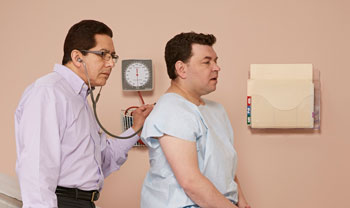How Your Healthcare Provider Diagnoses Asthma
If your healthcare provider thinks you have asthma, you may need several visits to get a diagnosis. You may need tests. And you may need to see an asthma specialist.
Your healthcare provider will ask you about your personal and family health history. They will also want to know about your symptoms and may advise you to try some medicines. With all this information, they can make a diagnosis.
Health history
Your health history will include information about your:
-
Asthma symptoms. Do you have trouble breathing? Do you wheeze, cough, or have chest tightness? When do you have symptoms? How long have you had the symptoms? Do the symptoms cause problems with your daily activities or with sleeping? Do certain things make your symptoms worse?
-
Health history. Do you have other health problems? Other breathing problems? Allergies? Have you had any surgery?
-
Lifestyle. Do you take any medicines? Do you smoke or drink alcohol? Do you exercise? What type of work do you do? At work, are you exposed to animal proteins, enzymes, flour, natural rubber latex, certain reactive chemicals, air pollutants, or other substances?
-
Family health history. Do family members have serious health problems? Do they have asthma or allergies? Do they have breathing problems?
Other health problems
Part of diagnosing asthma is looking at whether you have any other health problems. This is very important to figure out your treatment. You may have blood tests or other tests like X-rays or scans to help diagnose other health problems.
Your health history will help your healthcare provider know if you have:
-
Other conditions with symptoms like asthma. Your health history helps your healthcare provider tell asthma apart from other conditions.
-
Other breathing problems. You may have asthma and another condition that causes breathing problems. For example, you may have allergies, COPD, or heart failure.
-
Other conditions and asthma. You may have other health problems that are more common in people with asthma. These often make asthma harder to control. For example, you may have reflux (gastroesophageal reflux disease or heartburn) and frequent or long-term sinus infections.

Physical exam
Your healthcare provider will give you an exam. The focus of the exam will be your respiratory system. This includes your nose, throat, chest, and lungs. Your provider will listen to your lungs with a stethoscope. They may listen for wheezing or other signs of asthma.
Spirometry
Spirometry is a lung function test. It measures the amount of air you breathe out (exhale). It also measures how quickly you can fully exhale. It may be used to diagnose many lung conditions.
Spirometry is advised for people with asthma. The results of this test help your healthcare provider make a diagnosis. It is also used to keep track of asthma and to see how well medicines are working.
During this test you will sit upright with a clip on your nose. You will breathe out as hard and fast as you can through your mouth into a tube connected to a machine. The test doesn't hurt.
Other tests
You may have other tests, such as fractional exhaled nitric oxide, peak expiratory flow, bronchial provocation, or allergy tests. Your healthcare team will tell you more about these tests if you need them.
After the diagnosis
Once asthma is diagnosed, you and your healthcare provider will talk about:
-
Triggers. What are your asthma triggers? What makes your symptoms worse? What should you do to stay away from triggers?
-
Symptoms. You will learn what to do if your symptoms get worse. This is your Asthma Action Plan.
-
Activities. You will talk about what you can do and should not do in your daily activities.
-
Medicines. You will learn how to use your medicines correctly and when to take them. This includes inhalers and nebulizers.
-
Follow-up. Have regular office visits. Schedule your next visit.